- Home
- W. Somerset Maugham
The Moon and Sixpence Page 10
The Moon and Sixpence Read online
Page 10
Mrs MacAndrew smoothed down the lap of her gown, and gold bangles fell over her wrists.
‘All that seems to me very far-fetched’, she said acidly. ‘I don’t deny that perhaps Amy took her husband a little too much for granted. If she hadn’t been so busy with her own affairs, I can’t believe that she wouldn’t have suspected something was the matter. I don’t think that Alec could have something on his mind for a year or more without my having a pretty shrewd idea of it.’
The Colonel stared into vacancy, and I wondered whether anyone could be quite so innocent of guile as he looked.
‘But that doesn’t prevent the fact that Charles Strickland is a heartless beast.’ She looked at me severely. ‘I can tell you why he left his wife—from pure selfishness and nothing else whatever.’
‘That is certainly the simplest explanation’, I said. But I thought it explained nothing. When, saying I was tired, I rose to go, Mrs Strickland made no attempt to detain me.
XVI
What followed showed that Mrs Strickland was a woman of character. Whatever anguish she suffered she concealed. She saw shrewdly that the world is quickly bored by the recital of misfortune, and willingly avoids the sight of distress. Whenever she went out—and compassion for her misadventure made her friends eager to entertain her—she bore a demeanour that was perfect. She was brave, but not too obviously; cheerful, but not brazenly; and she seemed more anxious to listen to the troubles of others than to discuss her own. Whenever she spoke of her husband it was with pity. Her attitude towards him at first perplexed me. One day she said to me:
‘You know, I’m convinced you were mistaken about Charles being alone. From what I’ve been able to gather from certain sources that I can’t tell you, I know that he didn’t leave England by himself.’
‘In that case he has a positive genius for covering up his tracks.’
She looked away and slightly coloured.
‘What I mean is, if anyone talks to you about it, please don’t contradict it if they say he eloped with somebody.’
‘Of course not.’
She changed the conversation as though it were a matter to which she attached no importance. I discovered presently that a peculiar story was circulating among her friends. They said that Charles Strickland had become infatuated with a French dancer, whom he had first seen in the ballet at the Empire, and had accompanied her to Paris. I could not find out how this had arisen, but, singularly enough, it created much sympathy for Mrs Strickland, and at the same time gave her not a little prestige. This was not without its use in the calling which she had decided to follow. Colonel MacAndrew had not exaggerated when he said she would be penniless, and it was necessary for her to earn her living as quickly as she could. She made up her mind to profit by her acquaintance with so many writers, and without loss of time began to learn shorthand and typewriting. Her education made it likely that she would be a typist more efficient than the average, and her story made her claims appealing. Her friends promised to send her work, and took care to recommend her to all theirs.
The MacAndrews, who were childless and in easy circumstances, arranged to undertake the care of the children, and Mrs Strickland had only herself to provide for. She let her flat and sold her furniture. She settled in two tiny rooms in Westminster, and faced the world anew. She was so efficient that it was certain she would make a success of the adventure.
XVII
It was about five years after this that I decided to live in Paris for a while. I was growing stale in London. I was tired of doing much the same thing every day. My friends pursued their course with uneventfulness; they had no longer any surprises for me, and when I met them I knew pretty well what they would say; even their love-affairs had a tedious banality. We were like tram-cars running on their lines from terminus to terminus, and it was possible to calculate within small limits the number of passengers they would carry. Life was ordered too pleasantly. I was seized with panic. I gave up my small apartment, sold my few belongings, and resolved to start afresh.
I called on Mrs Strickland before I left. I had not seen her for some time, and I noticed changes in her; it was not only that she was older, thinner, and more lined; I think her character had altered. She had made a success of her business, and now had an office in Chancery Lane; she did little typing herself, but spent her time correcting the work of the four girls she employed. She had had the idea of giving it a certain daintiness, and she made much use of blue and red inks; she bound the copy in coarse paper, that looked vaguely like watered silk, in various pale colours; and she had acquired a reputation for neatness and accuracy. She was making money. But she could not get over the idea that to earn her living was somewhat undignified, and she was inclined to remind you that she was a lady by birth. She could not help bringing into her conversation the names of people she knew which would satisfy you that she had not sunk in the social scale. She was a little ashamed of her courage and business capacity, but delighted that she was going to dine the next night with a K.C. who lived in South Kensington. She was pleased to be able to tell you that her son was at Cambridge, and it was with a little laugh that she spoke of the rush of dances to which her daughter, just out, was invited. I suppose I said a very stupid thing.
‘Is she going into your business?’ I asked.
‘Oh no; I wouldn’t let her do that’, Mrs Strickland answered. ‘She’s so pretty. I’m sure she’ll marry well.’
‘I should have thought it would be a help to you.’
‘Several people have suggested that she should go on the stage, but of course I couldn’t consent to that. I know all the chief dramatists, and I could get her a part tomorrow, but I shouldn’t like her to mix with all sorts of people.’
I was a little chilled by Mrs Strickland’s exclusiveness.
‘Do you ever hear of your husband?’
‘No; I haven’t heard a word. He may be dead for all I know.’
‘I may run across him in Paris. Would you like me to let you know about him?’
She hesitated a minute.
‘If he’s in any real want I’m prepared to help him a little. I’d send you a certain sum of money, and you could give it him gradually, as he needed it.’
‘That’s very good of you’, I said.
But I knew it was not kindness that prompted the offer. It is not true that suffering ennobles the character; happiness does that sometimes, but suffering, for the most part, makes men petty and vindictive.
XVIII
In point of fact, I met Strickland before I had been a fortnight in Paris.
I quickly found myself a tiny apartment on the fifth floor of a house in the Rue des Dames, and for a couple of hundred francs bought at a second-hand dealer’s enough furniture to make it habitable. I arranged with the concierge to make my coffee in the morning and to keep the place clean. Then I went to see my friend Dirk Stroeve.
Dirk Stroeve was one of those persons whom, according to your character, you cannot think of without derisive laughter or an embarrassed shrug of the shoulders. Nature had made him a buffoon. He was a painter, but a very bad one, whom I had met in Rome, and I still remembered his pictures. He had a genuine enthusiasm for the commonplace. His soul palpitating with love of art, he painted the models who hung about the stairway of Bernini in the Piazza di Spagna, undaunted by their obvious picturesqueness; and his studio was full of canvases on which were portrayed moustachioed, large-eyed peasants in peaked hats, urchins in becoming rags, and women in bright petticoats. Sometimes they lounged at the steps of a church, and sometimes dallied among cypresses against a cloudless sky; sometimes they made love by a Renaissance well-head, and sometimes they wandered through the Campagna by the side of an ox-wagon. They were carefully drawn and carefully painted. A photograph could not have been more exact. One of the painters at the Villa Medici had called him Le Maître de la Boîte à Chocolats. To look at his pictures you would have thought that Monet, Manet, and the rest of the Impressionists had never be
en.
‘I don’t pretend to be a great painter’, he said. ‘I’m not a Michael Angelo, no, but I have something. I sell. I bring romance into the homes of all sorts of people. Do you know, they buy my pictures not only in Holland, but in Norway and Sweden and Denmark? It’s mostly merchants who buy them, and rich tradesmen. You can’t imagine what the winters are like in those countries, so long and dark and cold. They like to think that Italy is like my pictures. That’s what they expect. That’s what I expected Italy to be before I came here.’
And I think that was the vision that had remained with him always, dazzling his eyes so that he could not see the truth; and notwithstanding the brutality of fact, he continued to see with the eyes of the spirit an Italy of romantic brigands and picturesque ruins. It was an ideal that he painted—a poor one, common, and shop-soiled, but still it was an ideal; and it gave his character a definite charm.
It was because I felt this that Dirk Stroeve was not to me, as to others, merely an object of ridicule. His fellow-painters made no secret of their contempt for his work, but he earned a fair amount of money, and they did not hesitate to make free use of his purse. He was generous, and the needy, laughing at him because he believed so naïvely their stories of distress, borrowed from him with effrontery. He was very emotional, yet his feeling, so easily aroused, had in it something absurd, so that you accepted his kindness, but felt no gratitude. To take money from him was like robbing a child, and you despised him because he was so foolish. I imagine that a pickpocket, proud of his light fingers, must feel a sort of indignation with the careless woman who leaves in a cab a vanity-bag with all her jewels in it. Nature had made him a butt, but had denied him insensibility. He writhed under the jokes, practical and otherwise, which were perpetually made at his expense, and yet never ceased, it seemed wilfully, to expose himself to them. He was constantly wounded, and yet his good nature was such that he could not bear malice: the viper might sting him, but he never learned by experience, and had no sooner recovered from his pain than he tenderly placed it once more in his bosom. His life was a tragedy written in the terms of knock-about farce. Because I did not laugh at him he was grateful to me, and he used to pour into my sympathetic ear the long list of his troubles. The saddest thing about them was that they were grotesque, and the more pathetic they were, the more you wanted to laugh.
But though so bad a painter, he had a very delicate feeling for art, and to go with him to picture galleries was a rare treat. His enthusiasm was sincere and his criticism acute. He was catholic. He had not only a true appreciation of the old masters, but sympathy with the moderns. He was quick to discover talent, and his praise was generous. I think I have never known a man whose judgement was surer. And he was better educated than most painters. He was not, like most of them, ignorant of kindred arts, and his taste for music and literature gave depth and variety to his comprehension of painting. To a young man like myself his advice and guidance was of incomparable value.
When I left Rome I corresponded with him, and about once in two months received from him long letters in queer English, which brought before me vividly his spluttering, enthusiastic, gesticulating conversation. Some time before I went to Paris he had married an Englishwoman, and was now settled in a studio in Montmartre. I had not seen him for four years, and had never met his wife.
XIX
I had not announced my arrival to Stroeve, and when I rang the bell of his studio, on opening the door himself, for a moment he did not know me. Then he gave a cry of delighted surprise and drew me in. It was charming to be welcomed with so much eagerness. His wife was seated near the stove at her sewing, and she rose as I came in. He introduced me.
‘Don’t you remember?’ he said to her. ‘I’ve talked to you about him often.’ And then to me: ‘But why didn’t you let me know you were coming? How long have you been here? How long are you going to stay? Why didn’t you come an hour earlier, and we would have dined together?’
He bombarded me with questions. He sat me down in a chair, patting me as though I were a cushion, pressed cigars upon me, cakes, wine. He could not leave me alone. He was heart-broken because he had no whisky, wanted to make coffee for me, racked his brain for something he could possibly do for me, and beamed and laughed, and in the exuberance of his delight sweated at every pore.
‘You haven’t changed’, I said, smiling, as I looked at him.
He had the same absurd appearance that I remembered. He was a fat little man, with short legs, young still—he could not have been more than thirty—but prematurely bald. His face was perfectly round, and he had a very high colour, a white skin, red cheeks, and red lips. His eyes were blue and round too, he wore large gold-rimmed spectacles, and his eyebrows were so fair that you could not see them. He reminded you of those jolly, fat merchants that Rubens painted.
When I told him that I meant to live in Paris for a while, and had taken an apartment, he reproached me bitterly for not having let him know. He would have found me an apartment himself, and lent me furniture—did I really mean that I had gone to the expense of buying it?—and he would have helped me to move in. He really looked upon it as unfriendly that I had not given him the opportunity of making himself useful to me. Meanwhile, Mrs Stroeve sat quietly mending her stockings, without talking, and she listened to all he said with a quiet smile on her lips.
‘So, you see, I’m married’, he said suddenly; ‘what do you think of my wife?’
He beamed at her, and settled his spectacles on the bridge of his nose. The sweat made them constantly slip down.
‘What on earth do you expect me to say to that?’ I laughed.
‘Really, Dirk’, put in Mrs Stroeve, smiling.
‘But isn’t she wonderful? I tell you, my boy, lose no time; get married as soon as ever you can. I’m the happiest man alive. Look at her sitting there. Doesn’t she make a picture? Chardin, eh? I’ve seen all the most beautiful women in the world; I’ve never seen anyone more beautiful than Madame Dirk Stroeve.’
‘If you don’t be quiet, Dirk, I shall go away.’
‘Mon petit chou’, he said.
She flushed a little, embarrassed by the passion in his tone. His letters had told me that he was very much in love with his wife, and I saw that he could hardly take his eyes off her. I could not tell if she loved him. Poor pantaloon, he was not an object to excite love, but the smile in her eyes was affectionate, and it was possible that her reserve concealed a very deep feeling. She was not the ravishing creature that his love-sick fancy saw, but she had a grave comeliness. She was rather tall, and her grey dress, simple and quite well-cut, did not hide the fact that her figure was beautiful. It was a figure that might have appealed more to the sculptor than to the costumier. Her hair, brown and abundant, was plainly done, her face was very pale, and her features were good without being distinguished. She had quiet grey eyes. She just missed being beautiful, and in missing it was not even pretty. But when Stroeve spoke of Chardin it was not without reason, and she reminded me curiously of that pleasant housewife in her mob-cap and apron whom the great painter has immortalized. I could imagine her sedately busy among her pots and pans, making a ritual of her household duties, so that they acquired a moral significance; I did not suppose that she was clever or could ever be amusing, but there was something in her grave intentness which excited my interest. Her reserve was not without mystery. I wondered why she had married Dirk Stroeve. Though she was English, I could not exactly place her, and it was not obvious from what rank in society she sprang, what had been her upbringing, or how she had lived before her marriage. She was very silent, but when she spoke it was with a pleasant voice, and her manners were natural.
I asked Stroeve if he was working.
‘Working? I’m painting better than I’ve ever painted before.’
We sat in the studio, and he waved his hand to an unfinished picture on an easel. I gave a little start. He was painting a group of Italian peasants, in the costume of the Campagna, lounging
on the steps of a Roman church.
‘Is that what you’re doing now?’ I asked.
‘Yes. I can get my models here just as well as in Rome.’
‘Don’t you think it’s very beautiful?’ said Mrs Stroeve.
‘This foolish wife of mine thinks I’m a great artist’, said he.
His apologetic laugh did not disguise the pleasure that he felt. His eyes lingered on his picture. It was strange that his critical sense, so accurate and unconventional when he dealt with the work of others, should be satisfied in himself with what was hackneyed and vulgar beyond belief.
‘Show him some more of your pictures’, she said.
‘Shall I?’
Though he had suffered so much from the ridicule of his friends, Dirk Stroeve, eager for praise and naïvely self-satisfied, could never resist displaying his work. He brought out a picture of two curly-headed Italian urchins playing marbles.
‘Aren’t they sweet?’ said Mrs Stroeve.
And then he showed me more. I discovered that in Paris he had been painting just the same stale, obviously picturesque things that he had painted for years in Rome. It was all false, insincere, shoddy; and yet no one was more honest, sincere, and frank than Dirk Stroeve. Who could resolve the contradiction?
I do not know what put it into my head to ask:
‘I say, have you by any chance run across a painter called Charles Strickland?’
‘You don’t mean to say you know him?’ cried Stroeve.
‘Beast’, said his wife.
Stroeve laughed.
‘Ma pauvre chérie.’ He went over to her and kissed both her hands. ‘She doesn’t like him. How strange that you should know Strickland!’
‘I don’t like bad manners’, said Mrs Stroeve.
Dirk, laughing still, turned to me to explain.
‘You see, I asked him to come here one day and look at my pictures. Well, he came, and I showed him everything I had.’ Stroeve hesitated a moment with embarrassment. I do not know why he had begun the story against himself; he felt an awkwardness at finishing it. ‘He looked at—at my pictures, and he didn’t say anything. I thought he was reserving his judgement till the end. And at last I said: “There, that’s the lot!” He said: “I came to ask you to lend me twenty francs.”’

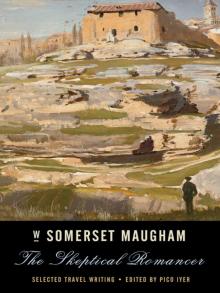 The Skeptical Romancer: Selected Travel Writing
The Skeptical Romancer: Selected Travel Writing The Summing Up
The Summing Up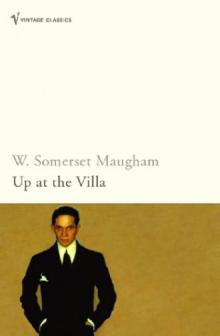 Up at the Villa
Up at the Villa The Razor's Edge
The Razor's Edge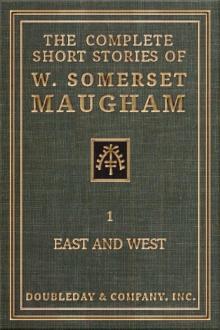 The Complete Short Stories of W. Somerset Maugham: East and West (Vol. 1 of 2))
The Complete Short Stories of W. Somerset Maugham: East and West (Vol. 1 of 2))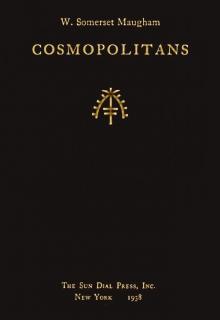 Cosmopolitans
Cosmopolitans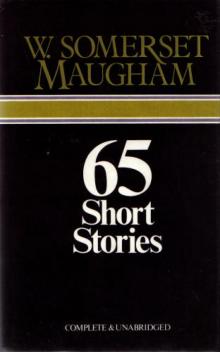 65 Short Stories
65 Short Stories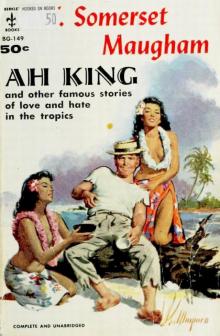 Ah King (Works of W. Somerset Maugham)
Ah King (Works of W. Somerset Maugham)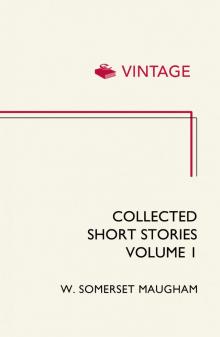 Collected Short Stories: Volume 1
Collected Short Stories: Volume 1 Collected Short Stories Volume 2
Collected Short Stories Volume 2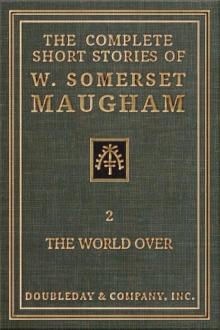 The Complete Short Stories of W. Somerset Maugham - II - The World Over
The Complete Short Stories of W. Somerset Maugham - II - The World Over Collected Short Stories Volume 4
Collected Short Stories Volume 4 Theatre
Theatre Short Stories
Short Stories Then and Now
Then and Now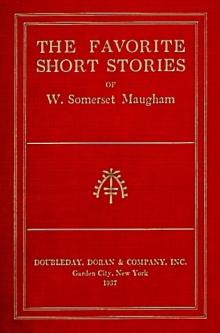 The Favorite Short Stories of W. Somerset Maugham
The Favorite Short Stories of W. Somerset Maugham Of Human Bondage
Of Human Bondage The Magician
The Magician The Great Exotic Novels and Short Stories of Somerset Maugham
The Great Exotic Novels and Short Stories of Somerset Maugham A Writer's Notebook
A Writer's Notebook Christmas Holiday
Christmas Holiday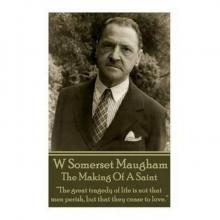 The Making of a Saint
The Making of a Saint Merry Go Round
Merry Go Round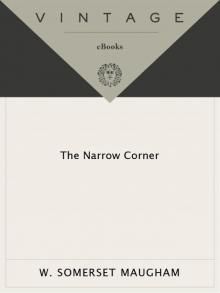 The Narrow Corner
The Narrow Corner Collected Short Stories Volume 3
Collected Short Stories Volume 3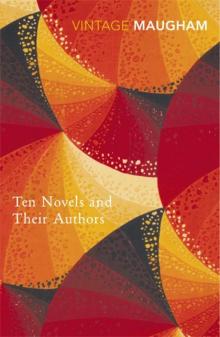 Ten Novels and Their Authors
Ten Novels and Their Authors Ashenden
Ashenden The Moon and Sixpence
The Moon and Sixpence Cakes and Ale
Cakes and Ale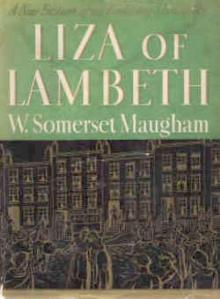 Liza of Lambeth
Liza of Lambeth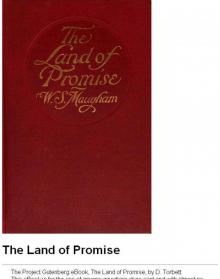 The Land of Promise: A Comedy in Four Acts (1922)
The Land of Promise: A Comedy in Four Acts (1922) A Writer's Notebook (Vintage International)
A Writer's Notebook (Vintage International)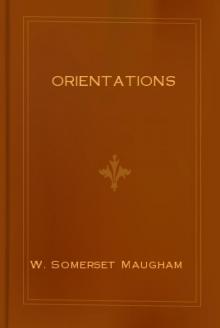 Orientations
Orientations Selected Masterpieces
Selected Masterpieces Mrs Craddock
Mrs Craddock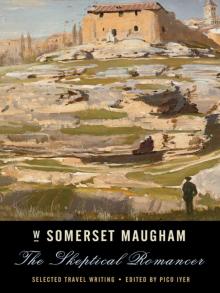 The Skeptical Romancer
The Skeptical Romancer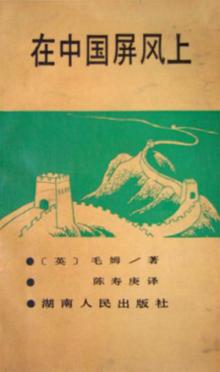 On a Chinese Screen
On a Chinese Screen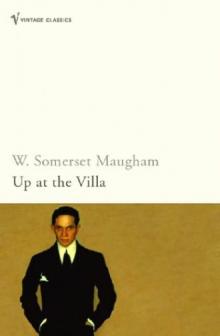 (1941) Up at the Villa
(1941) Up at the Villa The Great Novels and Short Stories of Somerset Maugham
The Great Novels and Short Stories of Somerset Maugham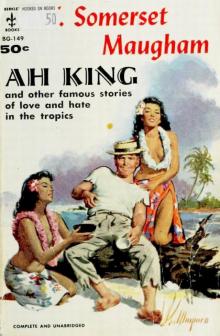 Ah King
Ah King The Explorer
The Explorer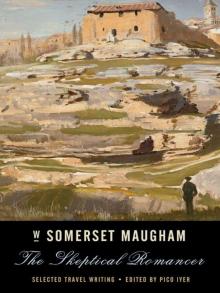 The Skeptical Romancer: Selected Travel Writing (Vintage Departures)
The Skeptical Romancer: Selected Travel Writing (Vintage Departures)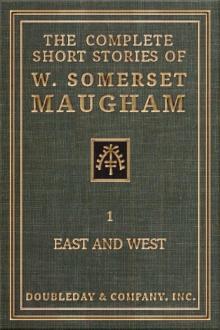 The Complete Short Stories of W. Somerset Maugham - I - East and West
The Complete Short Stories of W. Somerset Maugham - I - East and West